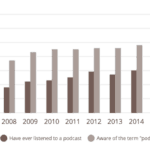Here’s What Happens When You Listen To 35+ Hours of Podcast Content

A few weeks ago, an article came out that introduced us to super listeners, a group of highly engaged podcast listeners, defined as people who consume twice the pod-content of other listeners. To note, super listeners are also sometimes known as power listeners. Along with a few others engaged in the podcast industry, I put this number at around 35 hours of listening per week. Many of these consumers listen to their podcasts on apps that allow them to speed up the voices of the hosts, thereby allowing more listening per day. I am not quite a super listener, as my weekly listening clocks in somewhere around 24 hours.
Let’s put all of this in context. If you are not a super listener, you’re probably wondering where these people find the time. If you are a super listener, you’re probably thinking, “So? What’s the big deal? 35 hours is nothing.” And it’s true; many super listeners actually report listening to 60+ hours of pod each week.
I found my way to 20+ hours of pod listening a week almost strictly as a result of my environment: Los Angeles traffic. I wrote about this experience in an earlier blog on Discover Pods. Surely, there’s got to be a strong correlation between the most heavily trafficked cities (Los Angeles, Houston, Atlanta) and the increasing number of super listeners.
A few weeks ago, I had the honor of chatting with Phoebe Lett of the New York Times Podcast Club, Kevin Goldberg of Discover Pods, and Brendan Hutchins, on his podcast the Podcast Playlist. We discussed the Discover Pods Awards Nominations of 2017 prior to the final voting round (you can listen to the episode here). I learned that Brendan listens to 35+ hours of pod each week. He was the first person I met who consumed this much content, and I was enthralled.
His experience got me thinking: what traits do super listeners share? What do they report about their consumption habits? And what’s the long term effect?
I’m here to focus on some of the data I’ve collected on super listeners. I surveyed super listeners from online Facebook groups and these are a few of the points that stood out to me:
Super listeners and their interactions with others:
- 59.1% of respondents listen to podcasts without other people, as a solitary activity.
- 77.3% of respondents consider themselves podcast evangelists, who want to convert others to listen to podcasts as much as them.
I’m definitely in the pod evangelist camp.
On WHY they listen to so many podcasts, these answers stood out to me:
- “I find them entertaining… and they stop negative and compulsive thinking that happens when I’m alone in my head.”
- “I hate wasted time. Podcasts fill the mindless hours of driving, cleaning, working out, and other mundane tasks.”
Podcasts are perfect for the ultimate multi-tasker.
- “…I have terminal cancer and I want to keep my brain active.”
Podcasts can and do provide respite and comfort.
On HOW/IF they retain the information the podcasts present:
I ask this question because when I started upping my listening, I realized I wasn’t retaining much. I had to take actions, like journaling, to make sure I was absorbing the information.
- “No, I don’t remember all I’ve listened to unless its very shocking or well done.”
Read that, pod producers? The bar is set high – shock value needed!
- “Depends, for audio drama ones for sure. For news and nonfiction I make a point of remembering things that make me curious or seem important.”
Here’s an example of selective podcast memory.
- “Some I keep notes and listen multiple times.”
The school approach to podcast listening.
Positive benefits reported from super listening:
- “Better knowledge of current events.”
- “Online communities and forums, some interaction with ‘friends’ I’ve met online.”
There are a growing number of online communities dedicated to podcast discussion and promotion. Check out Podcasts We Listen To and She Podcasts.
- “I’ve learned a lot and also discovered my career goal.”
Congrats to the podcast host that inspired this future lawyer!
- “The voices in my head saved my life. Long story.”
Well, awesome!
Negatives reported from super listening:
- “Less time spent reading, which used to be my favorite thing to do.”
- “I tend to want to listen in situations that aren’t appropriate lol (family time).”
*Gets wireless earbuds and grows long hair so no one knows you’re listening at the dinner table.*
- “I think I rely on them too heavily as a buffer for my mental health.”
- “Slight additional paranoia.”
- “Relationship struggles that I ‘spend more time on podcasts than my wife’… there’s been some dark times.”
We’ve got a lot more analysis ahead of us as podcasts continue to enter into the mainstream. Are you a big-time podcast listener? Do any of these findings resonate with you? And I invite you to write to me and let me know what are the positive effects you’ve experienced from podcast listening. Let us know!













Comments
Comments are closed.